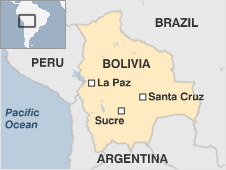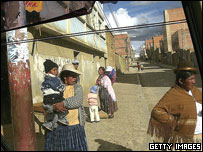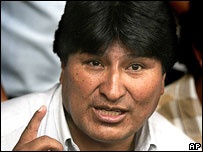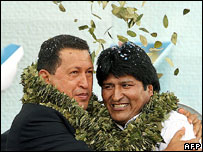 |
A country of statistical extremes landlocked Bolivia is the highest and
most isolated country in South America.
It has the largest proportion of indigenous people who make up around two-thirds of the population.
Overview
Though rich in mineral and energy resources Bolivia is one of South America's poorest countries. Wealthy urban elites who are mostly of Spanish ancestry have traditionally dominated political and economic life whereas most Bolivians are low-income subsistence farmers miners small traders or artisans.
AT-A-GLANCE
 Politics: Differences over the exploitation of energy resources underlie recurring political crises; Evo Morales is the first indigenous president
Economy: Poverty is rife and there are regional disparities in wealth distribution; Mr Morales opposes free-trade policies and has nationalised the energy sector
International: Mr Morales is a strong critic of the US which in turn is concerned about Bolivian coca cultivation; Bolivia has close ties with communist Cuba and Venezuela's Hugo Chavez
|
The country has the second-largest reserves of natural gas in South America but there have been long-running tensions over the exploitation and export of the resource. Indigenous groups say the country should not relinquish control of the reserves which they see as Bolivia's sole remaining natural resource.
Before President Evo Morales came to power the political fallout from the issue had helped to topple two presidents and had led to calls for regional autonomy including in prosperous oil-producing Santa Cruz.
In May 2006 President Morales delighted his supporters but sent shockwaves through the energy world when he put the energy industry under state control. Foreign energy firms were given six months to sell at least 51% of their holding to the state and negotiate new contracts or leave the country.
Bolivia underwent further radical change in January 2009 when voters backed President Morales' project for a new constitution that aimed to give greater rights to the indigenous majority population in the face of strong opposition from the wealthy elites and the resource-rich eastern provinces.
In the 1980s Bolivia experienced a deep economic recession. The tin market collapsed with the loss of about 21000 jobs inflation was rampant and the national currency was in severe crisis.
While strict austerity measures the introduction of a new currency and tax reform succeeded in curbing inflation and restoring foreign confidence these policies also widened the already huge wealth gap and generated great social unrest.
Bolivia is one of the world's largest producers of coca the raw material for cocaine. A crop-eradication programme though easing the flow of conditional US aid has incensed many of Bolivia's poorest farmers for whom coca is often the only source of income.
Facts
- Full name: Republic of Bolivia
- Population: 9.9 million (UN 2009)
- Capital: Sucre (official) La Paz (administrative)
- Largest city: Santa Cruz
- Area: 1.1 million sq km (424164 sq miles)
- Major languages: Spanish Quechua Aymara Guarani
- Major religion: Christianity
- Life expectancy: 63 years (men) 68 years (women) (UN)
- Monetary unit: 1 boliviano = 100 centavos
- Main exports: Soyabeans natural gas zinc gold silver lead tin antimony wood sugar
- GNI per capita: US$1460 (World Bank 2008)
- Internet domain: .bo
- International dialling code: +591
Leaders
President: Evo Morales
Socialist leader Evo Morales a figurehead for Bolivia's coca farmers won presidential elections in December 2005 the first indigenous Bolivian to do so. He described himself as the candidate "of the most disdained and discriminated against".

Indigenous leader Evo Morales defends traditional uses of coca leaf
|
His victory was decisive; he surpassed the figure needed to take office without the need for a vote in Congress. Much of his support came from Bolivia's indigenous majority.
A few months later in June 2006 he claimed victory in elections for a new assembly which was given the task of rewriting the constitution.
The resulting draft constitution accorded more rights to Bolivia's indigenous majority and more autonomy to the states. It also allowed the president to stand for re-election for a second five-year term in a row.
Angry and at times violent demonstrations by opponents mainly from the well-to-do elite followed and four of the country's richest regions declared autonomy in protest.
The new charter was finally approved by more than 60% of voters in a referendum in January 2009 although a majority in four out nine provinces voted against it.
Mr Morales has already nationalised much of the energy sector. In January 2007 he marked his first year in office with a speech promising further radical measures to help redistribute wealth. He pledged to raise taxes on foreign mining firms and re-distribute one-fifth of Bolivia's land to peasant farmers.
The president's economic policies are heartily disliked in the gas- and oil-producing regions in the east where many worry that the changes will frighten away foreign investors. However they remain popular among the poorer indigenous majority concentrated in the western highlands.

Political soul mates: Morales and Venezuela's Hugo Chavez (left)
|
Other policies have proved similarly controversial. A promise to relax restrictions on growing coca the raw material for cocaine irritated the US which has bankrolled the fight against drugs in the country.
Mr Morales defends the traditional uses of the coca leaf among the indigenous population. His government wants to exploit commercial and medicinal uses for the leaves.
Born in 1959 Evo Morales is an Aymara Indian from an impoverished family. In his youth he was a llama herder and a trumpet player. The former coca grower lost the 2002 presidential election to the conservative Gonzalo Sanchez de Lozada.
He is an admirer of two Latin American populist firebrands - Cuba's Fidel Castro and Venezuela's Hugo Chavez.
He succeeded caretaker leader Eduardo Rodriguez who took office in June 2005 when President Carlos Mesa resigned amid mass protests demanding the nationalisation of the energy sector.
Media
Private newspapers and broadcasters dominate Bolivia's media landscape; their ownership is highly concentrated.
Media rights body Reporters Without Borders noted in 2007 that Bolivia enjoyed greater press freedom than many of its neighbours. But it said journalists rarely covered sensitive topics including drug trafficking and corruption.
The organisation said media outlets had become targets in the settling of political scores with political volatility threatening to "widen the gap" between state-run and private media.
Newspaper readership is limited by low literacy levels. With hundreds of stations across the country radio is an important medium especially in rural areas.
The press
- La Razon - La Paz daily
- Los Tiempos - Cochabamba daily
- El Diario - La Paz daily
- El Deber - Santa Cruz daily
- El Mundo - Santa Cruz daily
- Correo del Sur - Sucre daily
Television
- Bolivision (Canal 4) - private Santa Cruz-based
- Unitel (Canal 9) - private Santa Cruz-based
- ATB Red Nacional (Canal 9) - private La Paz-based
- Red Uno (Canal 11) - private La Paz-based
- Television Boliviana (Canal 7) - government-run commercial
- TV Universitaria (Canal 13) - university station La Paz-based
- Red P.A.T. - private national
Radio
- Radio Fides - Catholic news and talk
- Radio Panamericana - national news and talk network
- Radio Illimani - state-run
- Radio Patria Nueva - state-run community network
News agencies
- Agencia Boliviana de Informacion (ABI) - government-run
-
Agencia de Noticias Fides (ANF) - owned by Catholic Church
AFRICA | ASIA-PACIFIC | AMERICAS | EUROPE | MIDDLEEAST | SOUTHASIA
Mauritania Mauritius Morocco Mozambique Namibia Niger Nigeria Republic-of-congo Rwanda Sao-tome-and-principe Senegal Seychelles Sierra-leone Somalia South-africa Sudan Swaziland Tanzania The-gambia Togo Tunisia Uganda zambia Zimbabwe Australia Brunei Burma Cambodia China East-timor Fiji Indonesia Japan Kazakhstan Kiribati Kyrgyzstan Laos Malaysia Marshall-islands Micronesia Mongolia Nauru New-zealand North-korea Palau Papua-new-guinea Samoa Singapore Solomon-islands South-korea Taiwan Tajikistan Thailand The-philippines Tonga Turkmenistan Tuvalu Uzbekistan Vanuatu Vietnam Antigua-and-barbuda Argentina Bahamas Barbados Belize Bolivia Brazil Canada Chile Colombia Costa-rica Cuba Dominica Dominican-republic Ecuador El-salvador Grenada Guatemala GuyanaHaiti Honduras Jamaica Mexico Nicaragua Panama Paraguay Peru St-kitts-and-nevis St-lucia St-vincent-and-the-grenadines Suriname Trinidad-and-tobago United-states-of-america Uruguay Venezuela Albania Andorra Armenia Austria Azerbaijan Belarus Belgium Bosnia-hercegovina Bulgaria Croatia Cyprus Czech-republic Denmark Estonia Finland France Georgia Germany Greece Hungary Iceland Ireland Italy Latvia Liechtenstein Lithuania Luxembourg Macedonia Malta Moldova Monaco Montenegro Norway Poland Portugal Russia San-marino Serbia Slovakia Slovenia Spain Sweden Switzerland The-netherlands Turkey Ukraine United-kingdom Vatican Algeria Egypt Iran Iraq Israel-and-palestinian-territories Jordan Kuwait Lebanon Libya Mauritania Oman Saudi-arabia Sudan Syria Tunisia United-arab-emirates Yemen Afghanistan Bangladesh Bhutan India Nepal Pakistan Sri-Lanka The-Maldives

